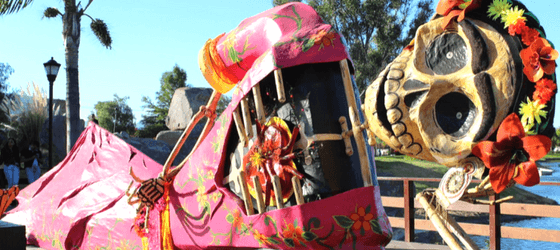The Day of the Dead is celebrated in many countries and cultures.
In Mexico, the Day of the Dead is known as Dia de Muertos. This holiday is mainly celebrated in the Southern and Central areas of Mexico, but also can be found in the North. It is thought, that the holiday originated through the indigenous people of Mexico and may date back to Aztec tradition and pre-Colombian culture.
The day of the dead is meant to honor those family members who have passed on before us. Some areas of Mexico honor deceased children on November 1 and honor deceased adults on November 2. However, other traditions celebrate the Day of the Dead on November 1 for any-aged, deceased family member.

In Mexico and even here in the United States, you may see the traditional private altars (ofrendas) built by family members with candles that have been lit in honor of the deceased family member.
It is also common to visit the graves of loved ones and to leave small gifts at their graves. Some common gifts might include the favorite food or beverage of the departed. The idea is to honor the ones who died and to aid them in their continued spiritual journey.
The holiday has now spread throughout the world and is a holiday in many cultures. Further, it has become commonplace to celebrate the Day of the Dead at the same time of the traditional All Saints’ Day through a Catholic church.
Just as the living celebrate the Day of the Dead to honor those who died before them, the living should prepare for their actual day of death to honor those left behind.
By ignoring the fact that we will all eventually face death and to fail to make plans in that certain event, we are putting our still living loved ones in a terrible position. Knowing that eventually we will all face death, I feel that it is our duty to our love ones to make sure that we have plans in place.
No one wants to think about death, but ignoring the fact that death will eventually come will not somehow magically prevent us from passing away.
When we die, our families already have enough to worry about. They don’t need additional stress. Even a family that is strongly united can face extreme division and discord when dealing with the death of family member.
They face not only the short term questions such as burial plans, but also the long term questions of what to do with your property. It is not fair to your loved ones to avoid this unpleasant, but necessary, conversation with your love ones.
In addition, your death without any plan, will now cost your loved ones even more money as the Court may have to oversee everything that needs to be done to disperse your estate (property).
So what can be done?
There is something in Texas called the living will. The Living Will usually consists of five different documents. Four of the documents are used to handle issues that may arise while you’re living. The last document, which is your Will, is the document that will handle the division of your property and debts.
You really need to have all five documents.
And, while you can get some of these documents at Office Depot or Legal Zoom or some other place on the Internet, many of those inexpensive documents are just plain wrong.
For issues that are so important and so critical, why would you trust a document that may not have even been written for the State of Texas? Living Wills, in most cases, are simply not that expensive.
You’re not going to find a quality Living Will for the $99 you may pay for a cookie-cutter document, but for peace of mind, a Living Will prepared just for you really is priceless.

1. The first Living Will document is the Power of Attorney for Healthcare.
This document appoints someone who you feel comfortable making healthcare decisions for you. And everyone is different. Therefore, it is critical that you appoint someone who holds the same values that you hold.
For example, it should be somebody who will follow your wishes in regards to a medical decision where the question of whether you would want to be kept alive on a machine or be allowed to die as gently as possible may be presented.
You should realize that this Medical Power of Attorney will not be effective until doctors determine that you are unable to make healthcare decisions for yourself. In other words, as long as you are able to communicate to the medical staff your wants and desires, no one else can make healthcare decisions for you.
The document also helps quite a bit because doctors are naturally hesitant to take some action that may involve a person’s death without some sort of proof that the person has the authority to make such decisions. You will also appoint a second person just in case the first person is unable or unwilling to make healthcare decisions on your behalf.
2. The second document included in the standard Living Will, is known as the Durable Power of Attorney.
The Durable Power of Attorney does not deal with medical questions, but is used to allow another person to make decisions on your behalf in regards to basic, day-to-day activities. For example, dealing with bank accounts or retirement accounts or car titles or even the sale of real property.
Further, the Durable Power of Attorney can either become effective immediately upon signature or effective upon disability. Obviously, there is a huge amount of trust that must be held with the person you are appointing.
The person that you appoint could potentially take money from you or sell a property that you own or do other things that you may not want them to do. Even with the potential risk, most people have someone that they trust implicitly and they make the Durable Power of Attorney effective upon signing.
3. The third document in a Living Will package is the Directive to Physicians.
In this document, you will be allowed to choose a couple of different options in the event that you are unable to tell the doctor what you would want if you are in certain medical circumstances. This usually follows the instructions that you will tell the person who you appointed to make health care decisions for you if you are unable to make such decisions.
– For example, it will instruct the doctor caring for you that you do not want to be on a ventilator or some other machine that’s artificially keeping you alive and that you want to die as gently as possible. Or, it may tell the doctor to take whatever steps are necessary to keep you alive.
4. The fourth document is a HIPAA release.
A HIPAA release is a document that says who has permission to talk with your doctors and get medical records. For obvious reasons, it would be expected that whomever you have appointed in your Medical Power of Attorney would be the same person(s) that you would include on the HIPAA release.

5. Finally, we come to the document that everybody always thinks about, which is your Last Will and Testament.
Everyone always wants to concentrate on this document, but the other documents previously mentioned are just as important. In your Will, you are going to direct how you would like things divided once you die. In particular, you will be stating that how you want your property divided and to whom such property will go.
While the decisions of how to divide your property can be difficult, you are going to provide your love ones with peace of mind by taking care of this task for them. Most of the time, the division is very simple. If it is a husband and wife, normally, they will leave any property to the spouse and then if the spouse is not living the time of their death, the property will be divided among the children.
- The property is not usually specified or listed. If you are giving a particular gift to a particular person, then you may spell that out exactly. But normally, you are just saying in your Will that you want a particular person or persons to receive whatever property you own at the time of your death.
In addition, most people do not make a list of every single item and assign it to a particular person.
- In most cases, if there is a sentimental item that should go to a particular person, usually the person simply tells the person who is going to get the item that they want them to have the item when they die.
Of course make sure the entire family knows your desires so that everyone knows what to expect. If you expect major problems, you can choose to specify in your Will who will get a certain item, even if a small or sentimental item.
- In your Will, you will also appoint the person that you want to be in charge of your estate. And you will also pick a second person just in case the first person is unable to, or unwilling to, be the executor of your estate.
In many cases, the person chosen to be the executor of your Will be the same person that you previously choose to be your power of attorney. But, it could be someone different.
If the Wills are done by married couples, and if there are minor children that are left behind in a situation where both parents die, then the testator (person signing the Will) may want to include the name of somebody that they would like to be the guardian of their children. And this is a good idea.
However, keep in mind that a single parent who dies probably will not be able to create a guardianship over any minor child who still has a living parent. Certainly, a living parent in most cases will have priority when it comes to deciding where the child will live.
Be aware… that the Will cannot cover situations that are more contractual in nature.
For example, you’re 401K plan probably has beneficiary’s that you have selected. At the time of your death, the money in that 401(k) plan should be given to the beneficiary without the need of a Will. Life insurance is another example of money that will pass to the beneficiary without the necessity of a Will.
An issue that you may need to consider may arise if you have property in another country.
Many of my clients are from Mexico and some of them still own property in their home country. The Will that you sign in Texas will not dispose of property in Mexico. You must consult with an attorney from whatever country that you own property.
Also, if you were divorce after you made a previous Will and such Will still leaves property to your now former spouse, you should have your Living Will reviewed by an attorney.
So, when we get to the point where we are being remembered or where we are being honored in the tradition of the Day of the Dead, we should first honor our love ones by taking a lot of burden and stress off of their shoulders during what may be the most difficult time in their life.
Further, if you don’t have the Will, your assets will still be divided, but not according to your desires, but according to State law. And while in many cases the division may end up being the same, it will be much more costly to your loved ones to probate your estate if there is not a Will.
This information is very general. Consider this article an introduction to Living Will. And remember, death comes to all of us. If you really care about reducing the stress and the cost associated with your death, you should honor the living by taking these simple steps.
As always, we are available to help you with any questions or concerns.
